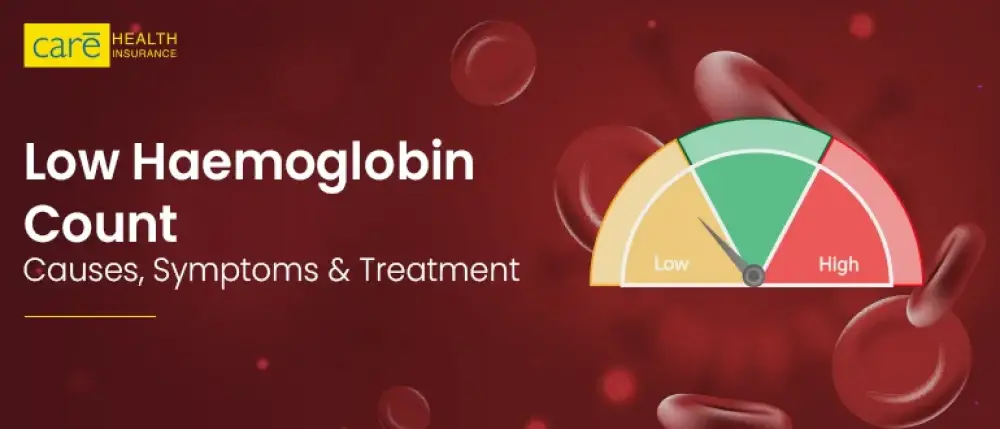Subscribe to get weekly insights
Always stay up to date with our newest articles sent direct to your inbox
Published on 21 Oct, 2024
Updated on 15 Apr, 2025
9238 Views
4 min Read

Written by Riya Lohia
favorite3Likes
Haemoglobin is a crucial protein found in red blood cells (RBCs), responsible for transporting oxygen from the lungs to the rest of the body. A low haemoglobin count can lead to several health issues, as the body's tissues and organs do not receive sufficient oxygen to function properly. This condition, commonly associated with anaemia, can cause symptoms ranging from fatigue and weakness to more severe complications if left untreated. Understanding the causes, symptoms, and treatment options for low haemoglobin is essential for managing this health issue effectively.
Haemoglobin is an iron-rich protein that gives red blood cells their characteristic red colour. It plays a vital role in maintaining the oxygen-carrying capacity of the blood. Each haemoglobin molecule binds to oxygen in the lungs and releases it into tissues throughout the body, ensuring that every organ receives the oxygen it needs to function properly. Haemoglobin levels are measured in grams per decilitre (g/dL), and normal levels typically range between:
A low haemoglobin count means the body’s ability to transport oxygen is compromised. This can lead to a variety of symptoms, including fatigue, weakness, shortness of breath, and dizziness. In more severe cases, it may affect cognitive function, cause irregular heartbeats, or lead to life-threatening complications such as organ damage. Low haemoglobin level can also be an indicator of underlying conditions like nutritional deficiencies, chronic diseases, or bone marrow disorders.
When haemoglobin levels fall below certain thresholds, it becomes a medical emergency. Dangerously low levels are generally considered to be:
Several factors can contribute to low haemoglobin levels, including:
The symptoms of low haemoglobin can vary depending on the severity of the condition. Common signs include:
If you are facing any of these signs of low hgb, contact your healthcare provider immediately.
Testing haemoglobin levels is a straightforward procedure. A complete blood count (CBC) test is usually conducted, where a small sample of blood is drawn from a vein, typically in the arm. This test measures not only haemoglobin levels but also other important components like red blood cell count, white blood cells, and platelets. For individuals with chronic illnesses, doctors may recommend routine haemoglobin testing to monitor the condition.
The treatment for low haemoglobin depends on the underlying cause and the severity of the condition. Some common treatment options include:
Preventing low haemoglobin is often possible through lifestyle changes and dietary adjustments:
Low haemoglobin is a common health issue that can have serious consequences if not managed properly. Early detection, understanding the causes, and seeking appropriate treatment are key to preventing complications. By maintaining a healthy diet, addressing any underlying medical conditions, and undergoing regular check-ups, individuals can keep their haemoglobin levels in a healthy range and ensure their bodies function optimally.
Whether caused by nutritional deficiencies, chronic illness, or blood loss, low haemoglobin is a condition that requires attention and care. If you experience any symptoms of low haemoglobin, consult with a healthcare provider to determine the best course of action. Additionally, it is recommended to invest in a proper health insurance plan for your family.Care Health Insurance offers you numerous health insurance plans that can provide coverage for you and your family.Depending on your insurance needs and your budget, you can choose between an individual or a family floater plan.
>> Also Read: Understanding Causes for Low Haemoglobin in Males
Disclaimer: The above information is for reference purposes only. Kindly consult your general physician for verified medical advice. The health insurance benefits are subject to policy terms and conditions. Refer to your policy documents for more information.
शुगर कंट्रोल कैसे करे? जानें, डायबिटीज में क्या खाना चाहिए Care Health Insurance in Health & Wellness
Thyroid : मामूली नहीं हैं महिलाओं में थायराइड होना, जानें इसके लक्षण और घरेलू उपचार Care Health Insurance in Diseases
हाई ब्लड प्रेशर को तुरंत कंट्रोल कैसे करें? देखें इसके उपाय Care Health Insurance in Diseases
प्लेटलेट्स की कमी के लक्षण, कारण और इलाज क्या है Care Health Insurance in Diseases
Seven Benefits of Good Posture You Must Know Care Health Insurance in Health & Wellness
Respiratory System: Anatomy of the Body’s Breathing Organ Care Health Insurance in Health & Wellness
Choking Skies - The Battle Against Air Pollution Care Health Insurance in Health & Wellness
Top Back Exercises to Strengthen Muscles and Prevent Injury Care Health Insurance in Fitness